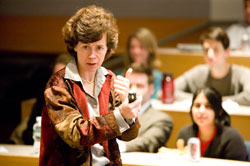Hundreds of Gallons of Water in Every Shirt
A founder of the MIT Sloan School of Management’s Sustainability Lab talks about how businesses and governments have to surmount social issues as well as economic ones if they are serious about sustainability.
Topics
Leading Sustainable Organizations
 Business strategy expert and longtime MIT Sloan professor Rebecca Henderson is a sustainability integrationist. Like other founding members of the school’s Laboratory for Sustainable Business (S-Lab), she finds sustainability’s implications everywhere in daily economic and social life—and everywhere interrelated. But among the multi-disciplinary angles from which she attacks sustainability are two questions that are interestingly oblique: What capabilities and behaviors make organizations themselves sustainable? And, why are some organizations so extraordinarily better than others at getting new things done? (Learn more about Henderson, and find selected links to her work.)
Business strategy expert and longtime MIT Sloan professor Rebecca Henderson is a sustainability integrationist. Like other founding members of the school’s Laboratory for Sustainable Business (S-Lab), she finds sustainability’s implications everywhere in daily economic and social life—and everywhere interrelated. But among the multi-disciplinary angles from which she attacks sustainability are two questions that are interestingly oblique: What capabilities and behaviors make organizations themselves sustainable? And, why are some organizations so extraordinarily better than others at getting new things done? (Learn more about Henderson, and find selected links to her work.)
In this installment of The MIT Sustainability Interview series, Henderson spoke with MIT Sloan Management Review editor-in-chief Michael S. Hopkins about the baseline understandings—and misunderstandings—about sustainability, and the choices it will present to leaders.
You’ve said that the concept of sustainability includes building sustainable societies and sustainable personal lives—that we can’t build an economic system that is in balance with the natural world without addressing the social issues. Why?
Well, we know the intersection between climate instability and political instability: every major region of the world where there is a failed state is also under very significant environmental stress. It’s most obvious in Sudan and Somalia, but we could point to areas in South America. Major environmental stress translates in a developing economy into agriculture problems and food problems, and when there’s not enough to eat, we have trouble.
The MIT Sustainability Interview Series
The MIT Sustainability Interview series includes thought leaders from arenas as diverse as management, urban studies, history, energy science, civil engineering, and design. The conversations area varied, but at root their goal is to help leading managers answer just two questions: “As sustainability—economic, environmental, social, and personal—becomes the defining business issue of our times, what decisions will I need to face, and what will I need to know when I face them?”
I remember reading a wonderful piece on why we shouldn’t respond to global warming, which could be translated more or less as, “We shouldn’t respond to global warming because it’s going to affect the grandchildren of peasants in Asia, and who cares about them?” But it is not okay to leave a scarred and broken world to our grandchildren.

Comment (1)
Sustaining Sustainability « Still thinking about a title…